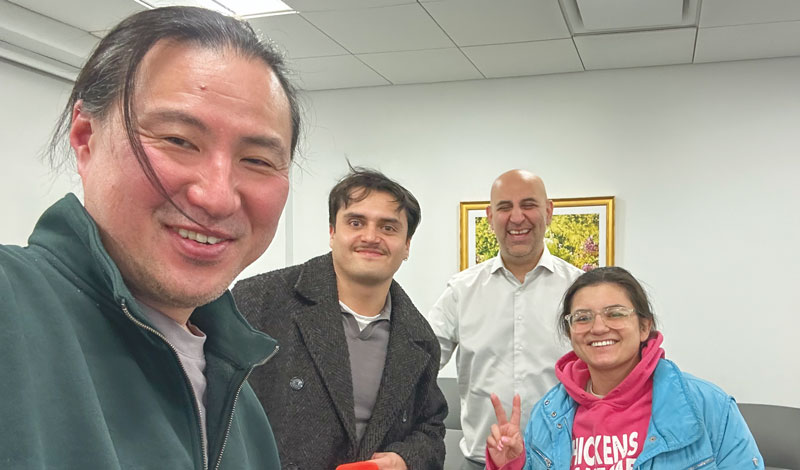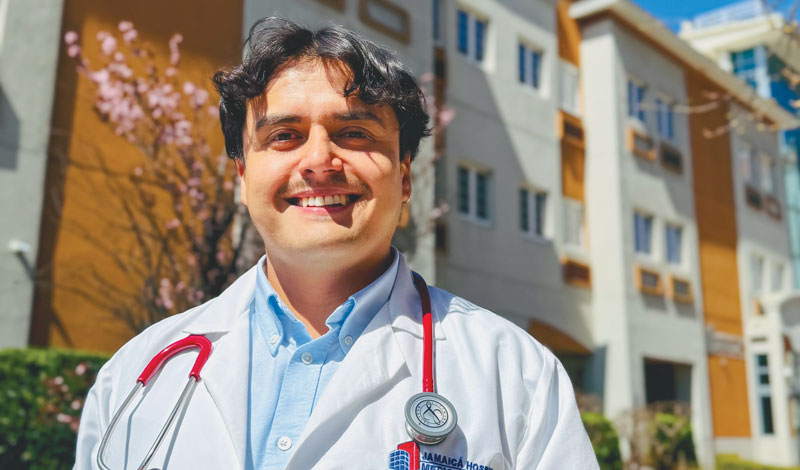by Fausto Cabezas
New York
It’s true, I said it with a kind of zeal—declared it with special insolence calculated to enrage the priests: “¡Un budista adoctrinado! by which I meant a Buddhist convert. Of course they were enraged—who could blame them? How could I be a Buddhist, when not another soul in my tiny town in the Colombian Andes was? Who on earth converted me? The answer, as shocking as any, was the World Wide Web of the early ’90s—I’d read about Buddhism on the internet and found its teachings in keeping with my private beliefs.
This, my teachers felt, was too much. In fact, it was felt by everyone in our little Catholic town of Pasto, that the line had been crossed long ago. As early as the first grade, it was noted that I was “too naughty,” “too curious,” “too effeminate,” ringing alarms in everyone I met. “Good for nothing,” the reprimand applied most, was used on me so often that it became something like a second name. With every punishment, every reprimand, every boot camp for unruly boys, I came to see what was so obvious to everyone else: There was something wrong with me.
My mother was a beacon of light in the dark. She left my father when I was 9, after which our home saw no violence. She was a schoolteacher, which meant she was poor, working two, sometimes three other jobs to make ends meet. Nevertheless, she always found a little money for books, or asked a relative to scour their shelves. Right around the time I discovered Buddhism, my uncle handed me a copy of Les Misérables, by literary giant Victor Hugo. Taking in its size and weight, I thought of the bragging rights to come and dove in. But I quickly forgot about showing off—in its pages I’d found a true companion, a voice that spoke in plain and lucid language my innermost thoughts. Among the book’s insights, all the more stunning for their obviousness, was this: A ton of human suffering is unnecessary. A ton is manmade and can be remedied if we understand that we can do so and believe this is our duty. I took Hugo’s side in many things, including this one: I was willing to entertain a divine will, but not as an explanation for misery.
Many evenings I climbed the hill to my house with my copy of Les Mis and read until the sky was dark and then peered into the valley below. Pasto’s lights climb into the hills and, if you squint, can be imagined to belong not to houses but skyscrapers, so that you are looking not over Pasto, but the skyline of a grand city—of New York, for instance. I would get out of here, I decided, and began studying intensively to do so.
When my teachers told me to leave if I wouldn’t go to church, I listened, maybe for the first time. I studied hard and earned an early diploma, plus a full ride to college. At 16, I left home in pursuit of happiness and the study of medicine.
Fast forward 15 years: I’m a physician, a kidney doctor, living in Bushwick, New York. The nurses tease me for my baby face, and it’s true that I am young.
One day in summer 2023, at the kidney transplant clinic, I was assigned to a patient with a complicated medical history. I was happy I was going to be able to communicate with her in her native language, Spanish.
Against all odds, she’d received a kidney transplant. She was in good health, yet suffering, more from fear than anything. She presented with a few mild and quite benign symptoms but feared that any one of these might indicate the return of the disease that had made the transplant necessary. I could feel her despair and thought to myself—I wish I could take away her suffering. Despite my best efforts to encourage her, I left in a mild despair of my own, feeling powerless to alleviate hers.
I talked this over with my supervisor, who sensed my heaviness. We talked about suffering, how everyone suffers, how it is our duty to lessen suffering wherever possible, but also, how even in suffering we can be happy. Curious, my questions became more pointed, until she told me that she was a Buddhist, an SGI member for over 40 years. When I inquired a little more, she handed me a card printed with a lotus flower and an SGI e-mail on the back. I didn’t hesitate to reach out.

In late 2023, a leader of Bushwick District invited me to my first discussion meeting. Thus, I ventured into the practice of Nichiren Buddhism. Chanting Nam-myoho-renge-kyo felt organic, peaceful and powerful. It feels, as the saying goes, like coming home—not to any particular place so much as to myself, my true self. It is a home I’ve searched for as long as I can remember, and in my case, is the bone-tired, grateful and rejuvenating homecoming of one so very long on the road.
Benefits have been many: Since beginning my Buddhist practice, I’ve become a U.S. citizen, finished the 14-year training to become a physician and begun to practice as such. However, I think the benefits of the practice extend above and beyond these things.
Recently, I learned that in the courtyard of Soka University of Japan there stands a statue of Victor Hugo, apparently one of Ikeda Sensei’s favorite authors. It bears an inscription from Les Misérables:
There is a spectacle greater than the sea, and that is the sky; there is a spectacle greater than the sky, and that is the human soul.
These words are in keeping with my greatest benefit—something I can neither see nor touch. In my case, it feels like a state of mind. A peaceful place where I can go at will, where I feel safe and warm and whole—my soul, my heart, my true self. As Nichiren Daishonin says, “More valuable than treasures in a storehouse are the treasures of the body, and the treasures of the heart are the most valuable of all” (“The Three Kinds of Treasure,” The Writings of Nichiren Daishonin, vol. 1, p. 851).
If suffering happens in isolation, healing happens in community, and as someone searching for belonging for so long, I can say that I have found my people. I’m proudly part of a community in which I am healing the wounds of the past and am proud to call myself a member of the SGI and declare myself in earnest, with deep appreciation, a Buddhist. We all suffer—hopefully no more than necessary—but even where it is unavoidable, we need not ever, ever, be miserable.
You are reading {{ meterCount }} of {{ meterMax }} free premium articles

